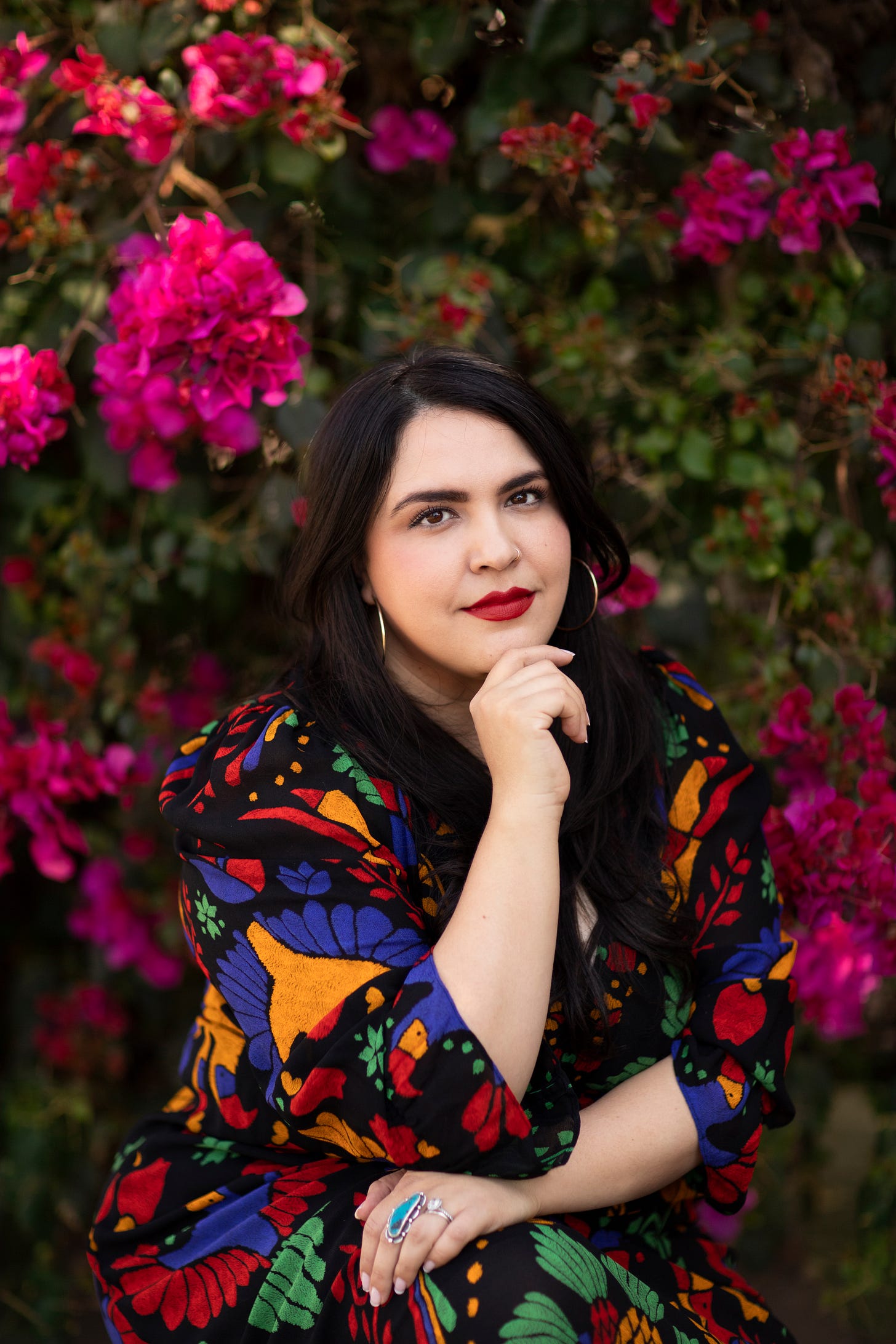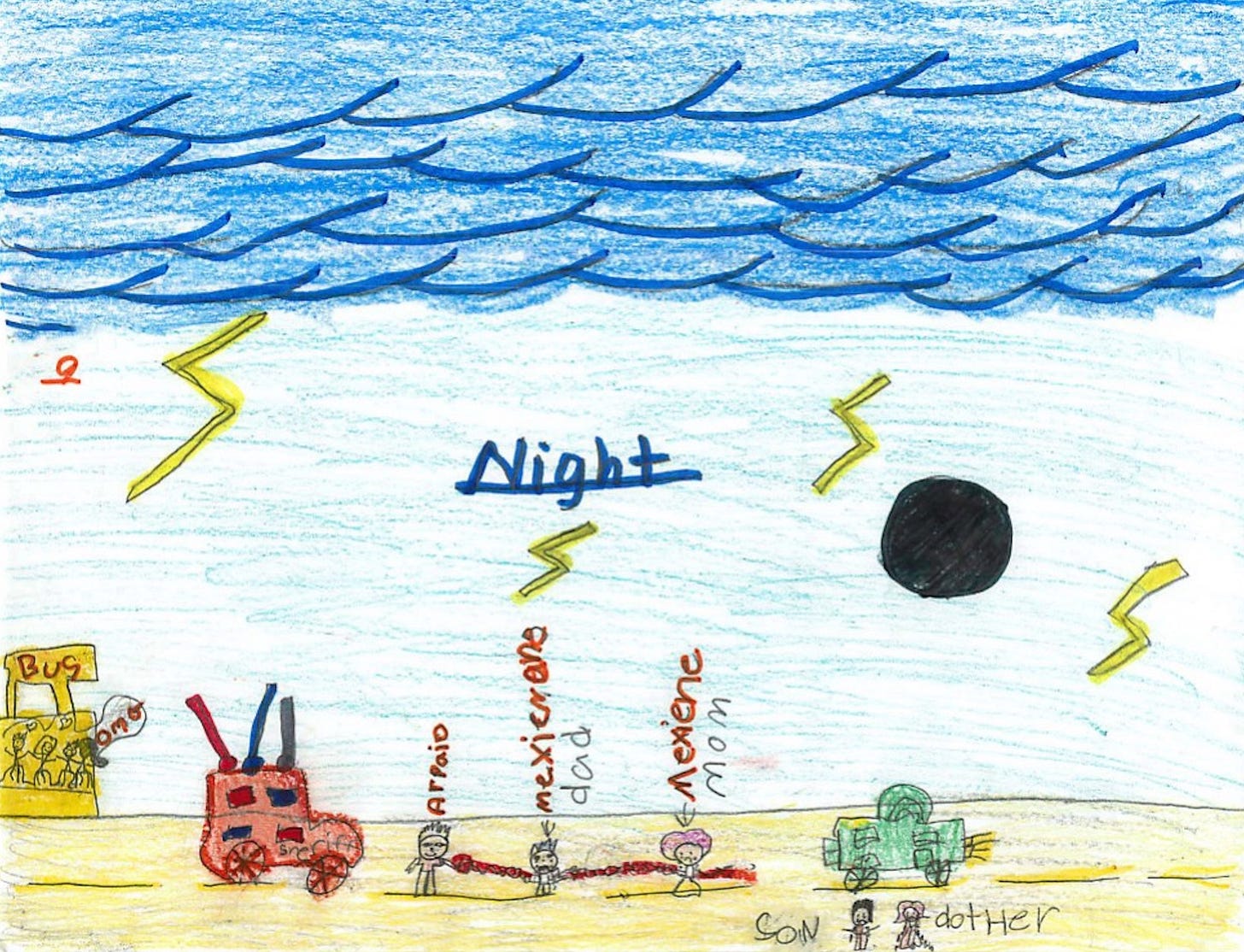“We like to think that we are a country where children are protected and innocence is sacred."
"But in practice, that's not what is happening." - Discussing art, healing, and family separation with Dr. Silvia Rodriguez Vega.
Fusing the personal and political, Silvia Rodriguez Vega’s scholarship challenges how we understand family separation, healing, and survival today. Currently an assistant professor in the Department of Chicana/o Studies at the University of California, Santa Barbara, Dr. Vega spoke with La Cuenta about her recently published book, Drawing Deportation: Art and Resistance among Immigrant Children.
Filled with the brilliance, sadness, and artistic acumen of many young people, Drawing Deportation is a prescient reminder of how the politics of immigration shape the lives of families and children. In this first part of our conversation, Silvia Rodriguez Vega reflects on the personal trajectory that led to the decade-long task of collecting, analyzing, and documenting youth images and theater work related to immigration.
Antero Garcia: You start the acknowledgements in your book by saying, "I wish this book did not need to exist and I did not need to write it." I really loved reading this book and, like your acknowledgement, I wish it didn’t have to exist. So, I’m curious, who do you hope reads this book and what other books do you wish existed instead of this one?
Silvia Rodriguez Vega: That's the kind of powerful question that we sadly don’t often get time to dream about or think of.
I just want kids to be healthy and happy and to not fear these systems, whether it's an immigration system or capitalist system or white supremacist system or a patriarchal heteronormative system. We like to think that we are a country where children are protected and innocence is sacred. All of that is part of our narrative and our ideals. But in practice, that's not what is happening.
So simply put, I wish we would live up to those ideals, not just about children and protecting them, but also about immigration. We are not “a nation of immigrants” like people say. We have all these narratives and tropes that are not actually practiced when it comes to Black and brown people.
I just want kids to be healthy and happy and to not fear these systems.
AG: I love that.
SRV: I want books with children doing art because they want to and not depicting horrific, sad, devastating things.
AG: You write about growing up in Arizona as a locus for how you engaged in this research. How did your background lead you to a path of eventually writing a book called Drawing Deportation?
SRV: That is something I've been reflecting on a lot. I actually was thinking this morning about a theater group that I was a part of when I was 12 or 13 years old. I was way too young for this program, but they let me try out, and they made me do an impromptu speech about dogs or something. After that they were like, "Okay, you can be in the theater group." I didn't know it at the time, but it was a program for “at-risk youth,” only later did I understand what that meant. At the time, it was something that I could do. And so I was in middle school and doing theater—specifically street theater and performing skits at different community centers, schools, and events. That really taught me a huge skill in terms of creating dialogue about issues happening in the community. One of my mentors was the director of the theater group, and she was doing her PhD on our group.
I want books of children doing art because they want to and not depicting horrific, sad, devastating things.
SRV: Oh, wow.
SRV: That was her dissertation project. And she was a PhD student at ASU. The dissertation she wrote about our theater group got an award. 14 years later, I got that exact same dissertation award.
AG: That's amazing.
SRV: To me, it was so powerful to see the cyclical nature of her as a mentor, me as a mentee, and now being in this place where I was writing a dissertation about children and youth and theater work. That's where its gone from the beginning to now. In between, we started our own theater group in Arizona as a way of organizing undocumented students. I was undocumented. A lot of my friends and I needed to feel a sense of control in terms of how we tell other people about these policies.
Theater was always something that I went back to. During my time as an undergrad in Arizona, I was working at a community center with kids, and so that I went back to using art and specifically theater, and I ended up collecting all of these drawings from children. I think that made me commit to the book. I wanted as many people as possible to see the drawings that I was looking at. Little did I know that was going to take me on an academic trajectory of 10 years plus. I feel like finally it's out and finally people can see it.
I wanted as many people as possible to see the drawings that I was looking at.
AG: As you were writing this book, seeing these images and the theater work, did you see yourself in the data? In the lives of the young people you were working alongside?
SRV: Not initially, but now that I look back, I feel like it was so obvious. It was staring me right in the face the entire time. Through the middle point of my PhD when I already had collected all the drawings from Arizona and I had done the project in California that included theater and more drawings, I began to think about my own journey. At that time, I was going through my own journey of permanent residency and citizenship. I started to see that I actually have been doing this work as a way of healing my own childhood.
I began to think about my own journey. I started to see that I actually have been doing this work as a way of healing my own childhood.

AG: This was work for you.
SRV: Yeah. It was about the children that I was working with. But now looking back retrospectively, I feel like it was a very much a part of my own journey and my own reflection as a child, as a teenager. I was able to see those nuances in the stories of the kids that I worked with.
AG: What was it like going through the process of becoming a resident at the same time that you were doing this research?
SRV: I was undocumented in Arizona when that was happening. When I went to do my Masters, my status changed and I was a permanent resident basically all through my PhD. As I was finishing, around when Trump was elected, I was like, "Okay, let me become a citizen," and did a GoFundMe to raise money and did the exam. I was ending my data collection at the school in South Central and starting to write the dissertation around this time. I was doing this analytical work and also having the anxiety of wondering where this PhD life is going to take me. Stressing about the job market.
AG: That's just the worst!
SRV: It's the worst. And it brings me back to the uncertainty related of my family's immigration status. The lack of feeling safe or being able to control my future was affecting how I analyzed this data. The work was very much about a process of inner understanding.
Propina
We’ll dive into some of the key findings from Drawing Deportation in the second part of our conversation. In the meantime, we invite you to check out the book or request a copy from your library.
See you next week!







